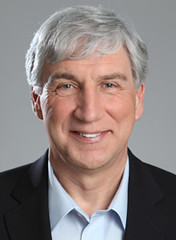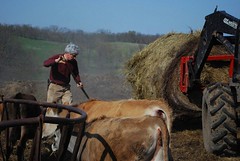For 25 years, American Rivers has released annual reports on “America’s Most Endangered Rivers.” Only one waterway in the Midwest made the group’s top ten list for 2010: Iowa’s Cedar River, which came in at number 5. American Rivers comments:
The Cedar River harbors globally rare plant communities, provides critical habitat for fish and wildlife, and is a popular destination for paddlers and anglers. However, outdated flood management and poor watershed planning are impacting public health and safety by causing pollution and increasing the risk of flood damage. The Army Corps of Engineers must prioritize lower cost, non-structural flood management solutions on the Cedar River. These natural solutions will help reduce flood damage, improve water quality, restore fish and wildlife habitat, and provide recreational opportunities and economic benefits while saving taxpayer dollars.
Go here to download a factsheet with more information about the Cedar River and why it’s “endangered.”
Perry Beeman posted the full press release from American Rivers at the Des Moines Register’s blog. Excerpt:
“We have an opportunity to learn from the devastating floods of 1993 and 2008 and rebuild smarter and stronger. We need to incorporate non-structural, natural solutions that provide flood protection, improve water quality, enhance fish and wildlife habitat, and provide recreational opportunities and economic benefits to local communities,” said Sean McMahon, state director of The Nature Conservancy in Iowa.
“It is time for Iowans to insist that state and federal flood protection policies work to reduce flood damage by moving people and structures out of harms way, allowing the flood plain to perform its natural function to absorb and slow the river’s flow during future floods,” said Susan Heathcote with Iowa Environmental Council.
“The newly-organized Cedar River Watershed Coalition has recognized the need to take a holistic approach to watershed management by reaching across city and county jurisdictions to take a whole watershed approach to flood mitigation and river restoration. This innovative group of concerned individuals and communities is committed to working together to reduce the impacts of flooding in the watershed and to improve water quality in the Cedar River,” said Rosalyn Lehman with Iowa Rivers Revival.
By 2008, the Cedar River had had two 500-year floods within 15 years. Rain falls on a radically changed landscape: plowed fields have replaced tall grass prairies; streams and creeks have been straightened; 90 percent of wetlands have been destroyed; floodplains have been filled and developed; and flows have doubled in just the last half century. Even without factoring in possible effects of climate change, which would exacerbate the problems, the landscape changes will bring more frequent and severe floods. The communities along the Cedar River deserve better, 21st century flood protection solutions to ensure public safety and river health.
The Cedar River, a tributary to the Mississippi River, provides drinking water to more than 120,000 residents, and roughly 530,000 people live and work in the Cedar River watershed. The primary land use in the watershed is agriculture and the river is a popular place for boating and fishing. The river is home to globally rare plant communities and fish and wildlife, including two species of endangered mussels.
In response to the devastating floods of 2008, the Iowa legislature passed a bill in 2009 requiring the Water Resources Coordinating Council to draft recommendations on “a watershed management approach to reduce the adverse impact of future flooding on this state’s residents, businesses, communities, and soil and water quality.” The WRCC submitted those recommendations in November 2009.
Unfortunately, Iowa legislators proved unwilling during the 2010 session to take even baby steps on floodplain management. A bill much weaker than the WRCC recommendations passed the Iowa Senate but never made it out of subcommittee in the Iowa House. The League of Cities, among others, lobbied against the measure. But don’t worry, if any of those cities experience a catastrophic flood, their lobbyists will urge legislators to send plenty of state taxpayer money their way.
I would like to see more cities adopt Davenport’s model for co-existing with a river:
In a nation that spends billions annually on structural flood protection (and billions more when the levees fail) Davenport is the national model for a more cost effective and environmentally responsible approach. We are the largest city in the nation on a major river without a system of levees and pumps for “flood control”. We’ve never had them. And we don’t want them. Instead of viewing the grand Mississippi as just another storm sewer, we treat it appropriately, with a broad floodplain in (99%) City ownership, now the focal point of our “River Vision” plan. The River Vision plan, developed in conjunction with our southern shore partner, Rock Island, Illinois, is the only bi-state riverfront brownfield redevelopment plan of its kind in the nation. Developed with the extraordinary public input of more than a thousand citizens, the plan is guiding the riverfront revitalization of the historic core of the Quad Cities, and has garnered the nation’s “Most Livable Small City” award from the US Conference of Mayors. In the historic 2008 Iowa floods, Davenport outperformed every city in the state. We even continued to play baseball at our riverfront ballpark as it became an island in the river. In 2009, our unique approach to floodplain management merited review by the National Academy of Science. A nine minute video of Davenport’s resilience through the 2008 floods is accessible online.
The University of Iowa’s Center for Global and Regional Environmental Research, in cooperation with other groups, has organized a series of seminars on “The Anatomy of Iowa Floods: Preparing for the Future.” The first of the free seminar series took place in Des Moines in March. After the jump I’ve posted the schedule and agenda for future seminars in Burlington, Cedar Rapids, and Waverly this month, and in Mason City and Ames in July.
If you care about protecting Iowa waterways, please consider joining any or all of the following groups: Iowa Environmental Council, Iowa Rivers Revival, Nature Conservancy in Iowa, and the Sierra Club Iowa chapter.
Continue Reading...

 I have begun to grasp how this official affects the food I eat, the quality of the air and rivers where I live, and waters far downstream from Iowa. I have even begun to hope for change in the way we produce food and use energy in Iowa, where we often set the example for farming practices across the country.
I have begun to grasp how this official affects the food I eat, the quality of the air and rivers where I live, and waters far downstream from Iowa. I have even begun to hope for change in the way we produce food and use energy in Iowa, where we often set the example for farming practices across the country. Radiance Dairy is no ordinary farm. Livestock and landscape nourish each other. Everything the cows eat is grown on land they fertilize, and as Francis says, they enjoy their work. He uses solar panels to power pumps for water , to electrify fences, and to heat water for his dairy processing plant. A wind turbine is in the works. His operation is so innovative that he attracts visitors who come to learn, from local schoolchildren to the World Bank, and he travels frequently to teach and give lectures. He has received awards from the Leopold Center for Sustainable Agriculture, and the Iowa Chapter of the Sierra Club, which recognized him as a “Steward of the Land,” among other awards. People who know him regard him as a national treasure.
Radiance Dairy is no ordinary farm. Livestock and landscape nourish each other. Everything the cows eat is grown on land they fertilize, and as Francis says, they enjoy their work. He uses solar panels to power pumps for water , to electrify fences, and to heat water for his dairy processing plant. A wind turbine is in the works. His operation is so innovative that he attracts visitors who come to learn, from local schoolchildren to the World Bank, and he travels frequently to teach and give lectures. He has received awards from the Leopold Center for Sustainable Agriculture, and the Iowa Chapter of the Sierra Club, which recognized him as a “Steward of the Land,” among other awards. People who know him regard him as a national treasure.